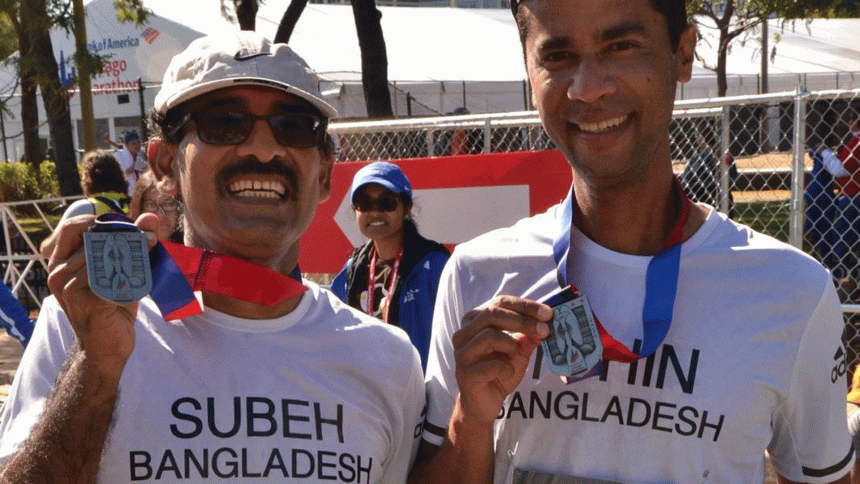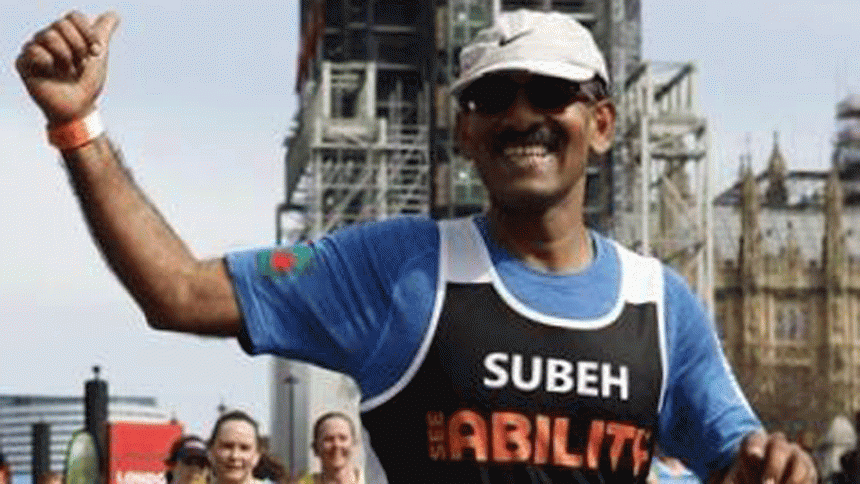My journey to marathons

There is a saying: "One run can change your day, many runs can change your life."
I never believed that I could one day be a long-distance runner until I was 44 years old. The reason is simple; I hardly performed well in any sports in my life, not even when I was a student.
Now I have a record of finishing four major marathons (42.2km) – three in London (2011, 2012, 2018) and one in Chicago (2016). I achieved my personal best record in the Chicago Marathon (4hr 33min), which I ran with my childhood friend Tuhin to celebrate my 50th birthday. Age shouldn't be a blocker to start running -- if I could run my best marathon at the age of 50, anybody can perform their best run at the age of 50.
I would like to share my journey and what it takes to become a long-distance runner.
I had never participated in any sports until I moved to Taiwan in 2003. In Taipei, I had access to extensive gym facilities, but also met many friends who inspired me to get into fitness. I started short-distance running and also started playing squash. Starting my fitness journey excited me -- but I was still far from running a marathon.
In 2005, I visited my friend Tuhin in the USA who took me to watch my first marathon in Ohio. The most inspiring moment that pushed me to consider marathon running was seeing a 70+year-old man finishing 42.2km. This man truly moved me -- how a man, older than my father, was able to run 42.2km, I wondered.
In 2007, I moved to Hong Kong where I met my colleague, Jean-Michel, who was a marathon runner and an inspiration. We became very close friends, and he taught and inspired me a lot about marathons. At this point, I started thinking seriously about increasing my running distance to work towards running my first marathon.
In early 2009, I moved to London on an international assignment. Soon after arriving in London I realised that London is the city for runners, with many running events across England every weekend. In my first year after moving to the UK, I enrolled to run a 10km to raise funds for Cancer Research, UK. It was my first public run, finishing in 70 minutes, alongside a few thousands participants. But the level of excitement after finishing 10km was enormous and I raised more than £1200 for the noble cause.
Looking back, this is the turning point for me in becoming a runner. After this event, I never looked back, and I started running every week. I ran my first half marathon in 2010 and my first full marathon in 2011. After running the first marathon, I received unimaginable encouragement and appreciation from my friends, colleagues and relatives. I was also able to raise money for Shelter, a charity group working to eradicate homelessness. After the marathon I also realised that I am more physically fit than I had ever been before, my energy levels were up and it had brought more discipline into my life.
Being one of the most prestigious marathons in the world, the London marathon is very difficult to get a place in; I was very lucky to participate again in 2012. After running the London marathon over two consecutive years, running has become part of my life. When people ask me about marathons, my biggest advice is that when you decide to run a marathon you are choosing a lifestyle -- one with disciplined food habits, sleep schedule and regular training. This has been the most rewarding lifestyle for me.
The purpose of this article is to encourage everyone to actively consider running or any fitness activity.
Can you run a marathon?
Short answer is, yes – I ran my first marathon at the age of 43 and I had my personal best marathon when I was 50 years old. So age is not a barrier unless you have any underlying health issues.

However, if you want to run a marathon, you should begin to assess your current health and whether or not you can take on long-distance running.
There are no hard and fast rules to say whether you are ready. However, there are certain guidelines that may help:
You have been running for at least six months. Running a marathon is extremely demanding on the body. Covering 42.2km by foot takes most runners closer to 4 to 5 hours. Marathon training is very taxing on the body, so it's best to have at least 6 months of consistent training under your belt, if not a year, before you even begin marathon training.
You can already run 12 KM to 16 KM – in general it's best to wait to start training for a marathon until you can run about 12 -16 KM continuously without stopping.
You need to build up to long runs of 32km to 40km. Almost all marathon training plans will build up to a long run of at least 32km, if not 36km or so. This means that you need to be able to build up from your current long run distance to the 32km long run and then taper for several weeks before marathon day.
You have completed a half marathon. Successfully completing 21.1km is a great sign that you are ready to begin full marathon training.
Last but certainly not the least, you should have a strong desire and motivation to run a marathon. Marathon is very physically and mentally demanding, and you should not feel like you have to do it. Rather, it should be an exciting adventure that fuels your desire to get out there and run every day.
Of course, there will be days that even the most enthusiastic marathon runners will struggle to feel motivated to train, but you definitely should assess whether your heart and head are saying " I WANT to run a marathon".
Ultimately, you know your own body and your own life best. If you feel ready to run a marathon and you want to run a marathon, then by all means, begin training.
*Subeh Khan spent 17 years in greater China and UK as part of international career in a multinational company. He is currently working for Abul Khair Group in Bangladesh.

 For all latest news, follow The Daily Star's Google News channel.
For all latest news, follow The Daily Star's Google News channel. 








Comments